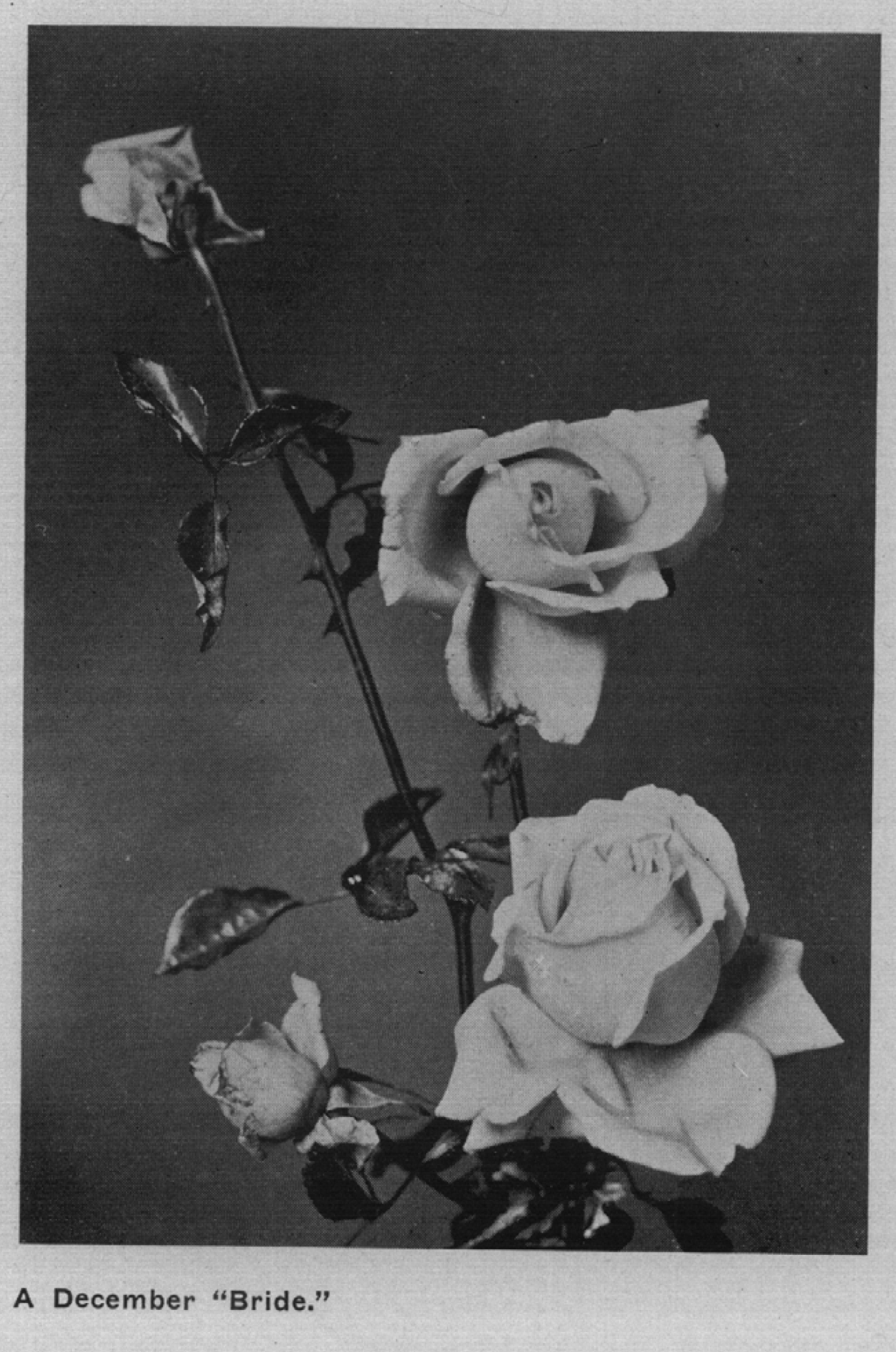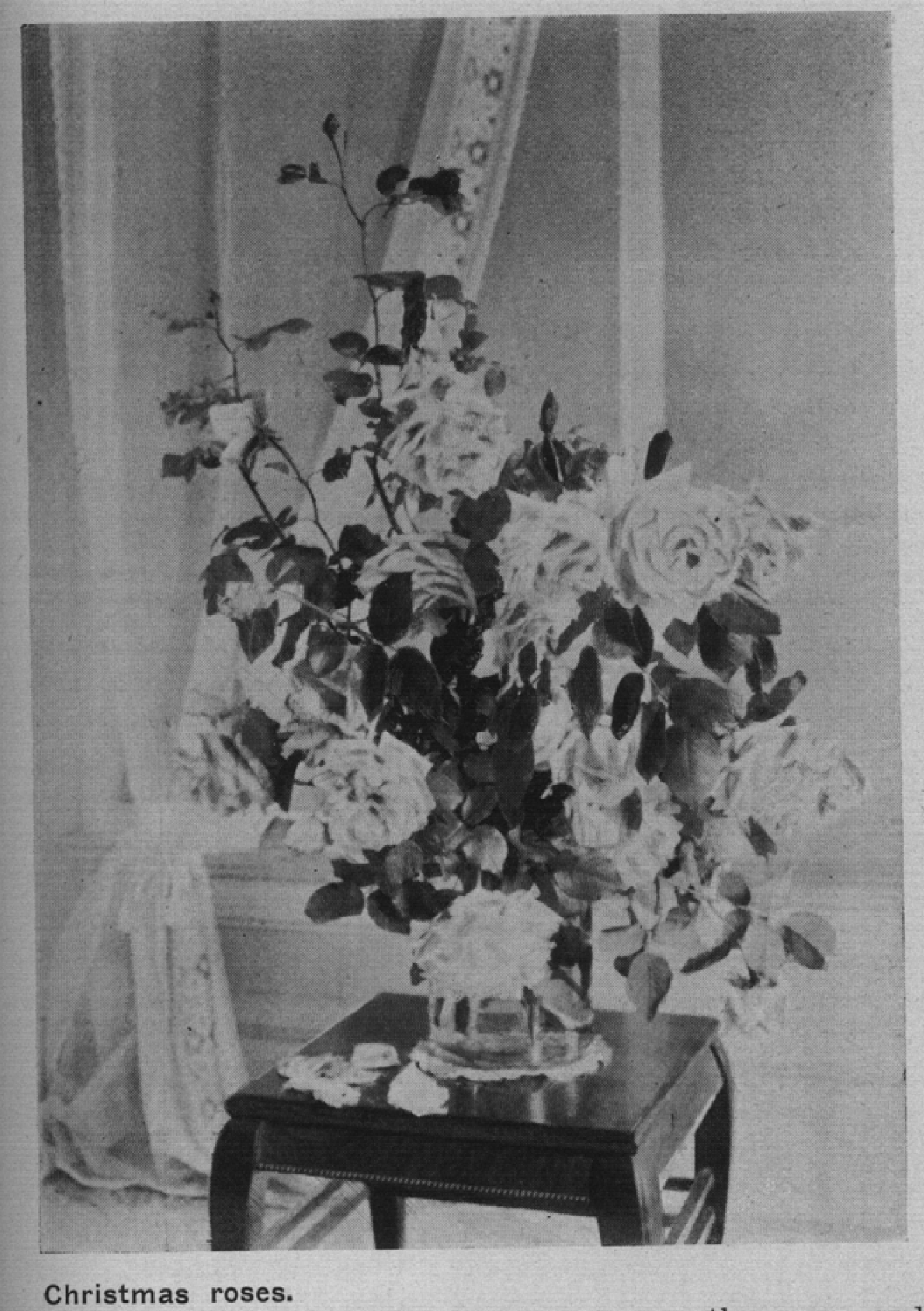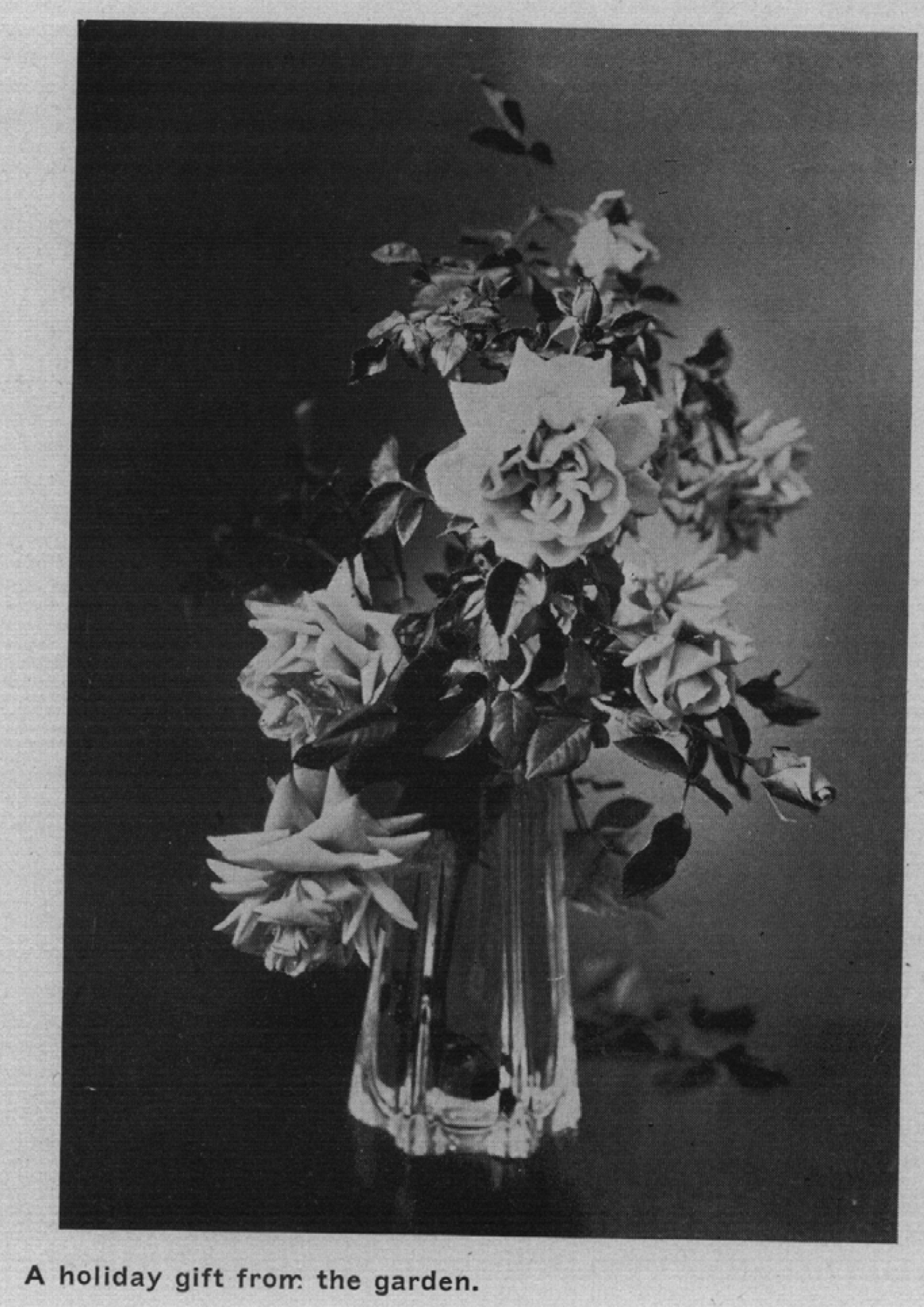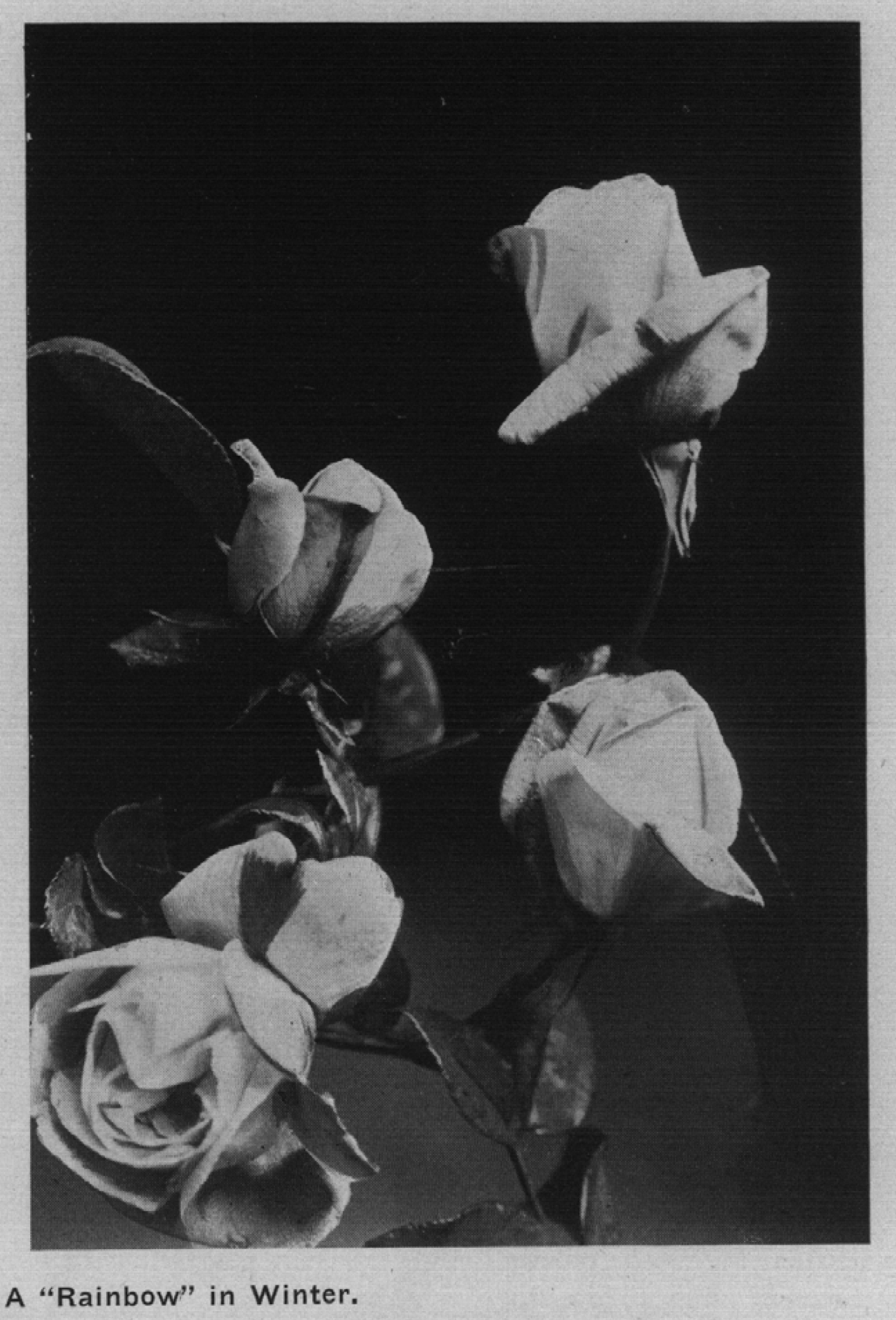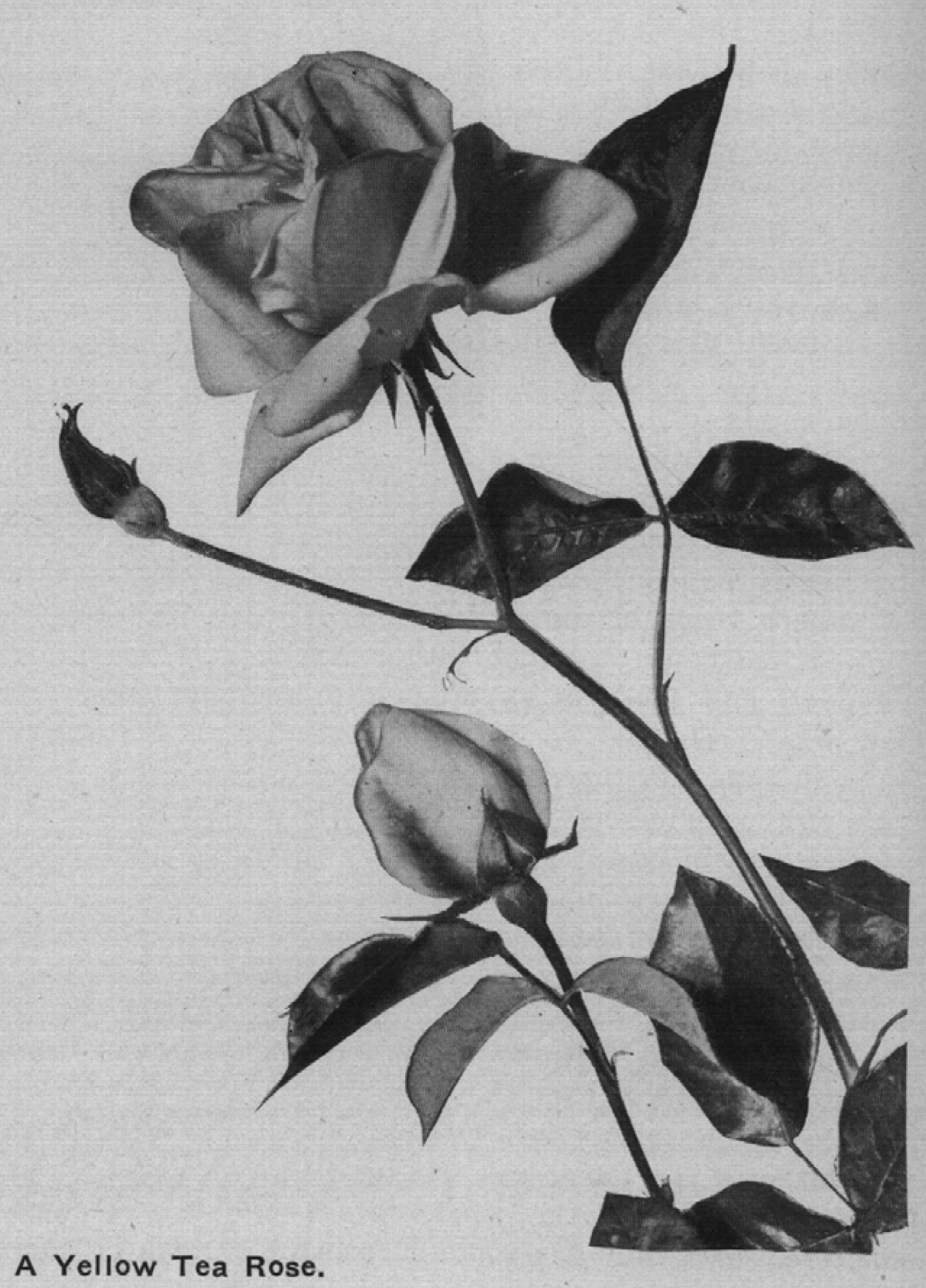Christmas roses.
Curtis, Martin. "Christmas roses." Overland Monthly 38, no. 6
(December 1901): 411-416.
[https://library-projects.providence.edu/rosarium/view?docId=tei/rg0051.xml]

"Gather ye rose buds while ye may,
Old time is still a-flying,
And this same flower that smiles to-day
To-morrow will be dying."
So sang the Elizabethan Herrick in England’s passing season, but the lyric, however sweet, could scarcely apply in California, where the poet may pluck a rose in June or January without the fear of robbing summer of its last treasure. However, if we would have roses at Christmas, we Californians must render careful attendance upon the queenly flower; for even in this wonderland of the West, the rose requires sedulous cultivation. In the England of Herrick’s time the servitors of a great household were wont to march into the banquet hall bearing before them the boar’s head, "all gaily decked with rosemary." The hospitable Californian of to-day would more fittingly deck his Yule-tide boar’s head with the best roses in the world—which he can cultivate in his own garden, if he loves flowers and has the leisure and patience to grow his blossoms as they should be grown.
I have written this article partly to show how much truth there is in the common Eastern notions of California’s perennial feast of flowers.
Thirty years ago the opinion was current among many good Eastern people that in California gold nuggets were waiting around in all sorts of places to be picked up by any one who chose to do so. To-day a somewhat similar opinion exists in regard to our roses. Reports, not at all exaggerated, have gone around the world of our rose fetes, where millions of blooms are sacrificed to make a California holiday. So now, over and above our sobriquet of Land of Sunshine, we are known as the Land of Roses, and it is popularly supposed that the bushes grow spontaneously with a never-ending supply of choice blossoms ready for the plucking.
Of course it gratifies our State pride to hear the generous praises of friends concerning this fairest of flowers, but we who cultivate them know only too well that they have a price like all other things of worth, and that this price is exactly proportionate to their ultimate perfection.
Yet nature must not be robbed of her due. With the thermometer seldom below 60 deg., and almost perpetual blue skies, it is not surprising that she seems to turn to us with evident relief from those lands where she is held sternly to her duty by King Frost, and that in her revolt from his blighting influences willfully refuses to separate her four charming daughters on conventional lines, and scatters her precious gifts with reckless prodigality throughout the year. If we want holly for Christmas we must import it, but, if we choose to have them so, our gardens may be gorgeous with roses and smilax, with carnations and chrysanthemums. Only if we choose, for successful gardening presupposes a partnership with this ever-generous yet ever-just dame whose decree that reaping follows sowing is as emphatic here as elsewhere in her realm.
If, then, one contemplates having a garden, he must be prepared to furnish his part of the capital: a piece of ground dug to the depth of a foot or eighteen inches; an assortment of flowers such as he most likes; a hose and a goodly number of implements; a zest for toil, untiring and continuous; patience, and lots of it; common sense as much as he has; love unfailing for the work. Having faithfully employed his stock he may safely trust the returns to the great silent partner.
Some one once asked Dr. Holmes when the education of a child should be begun. "A hundred years before it is born," was the prompt reply, and that is the cue for the gardener. The bewildering beauty of multitudinous roses no doubt seems little short of miraculous, but the methods of insuring it are strictly normal, and are the open secrets of the growers’ guild. This period of preparation is the chief of them, learned at first hand from the best of all teachers. When, in early Spring, acacia trees burst into glory, we hear on every side: "Wonderful; to-day ablaze; yesterday not a blossom." True, yet yesterday the buds were waiting breathlessly for the appointed time. Hardly had the last exquisite little yellow ball fallen last year than tiny red fingers appeared, terminating every bough. Slowly, day by day, they grew and changed until autumn discovered myriad clusters of golden green, and when the transformation came it was but the culmination of a whole year’s preparation plainly visible to watchful eyes. In our gardens the process is not so patent, and for springtime flowering we must labor betimes.
When, then, the golden crowned sparrow announces from every hedge and tree, in plaintive minor notes that fall has come, with all its soft and hazy atmosphere, and the strange rustle of the autumn wind fills you with a vague and restless melancholy, be sure your garden needs you. Turn your back upon all other forms of recreation and pleasure, and when you can say, "I am quite ready for the rains," your satisfaction will make the moment supreme.
The languid airs and graces that the great Mother permits herself at this season may set the pace as a leisurely one. Hurry is always an incongruous element in gardening—it is not to be tolerated now. I like best to take Polly and talk over the situation, listening to her trenchant criticisms of what constitutes good and bad qualities in roses, and getting her sometimes valuable suggestions. Then I send a message to Gordon for three loads of mulct; put a new spring in the pruning shears, sharpen shears and knife, nail an extra board on the wheelbarrow, look to the spade fork, and rake, examine my gauntlets that have no rips or torn places for insidious thorns, and then set the alarm clock for dawn. One is fairly in now and must be deaf to the hundred calling hill voices and blind to the beckoning of the idle woods.
The first step will be pruning, and nowhere does one’s experience count for so much. One of the State University professors, who is a lover and authority on this Queen of Flowers, maintains that the pruning incident to the cutting of roses for one’s self and friends keeps the bushes well enough down. I have not found it so, although my friends will attest to the bushels of blooms they carry away during the year, and Polly keeps our cottage bower. It is, however, true that the cutting of all roses should be a pruning, for the stem that has borne one fine blossom has often done its whole duty, and should be removed either back to the main stalk or at a considerable distance down, just above an “eye” looking to the outside of the bush. In this way much useless foliage is disposed of throughout the year, but one does not pluck every rose, and there is an accumulation of detrimental branches that ought to be taken away at this time. Therefore, cut fearlessly all interior growth, so that the new foliage may have a chance to breathe, and when the next blooms appear you will see by their improved texture and form, and increased richness in color that attention at this point was not unappreciated.
Always cut to an eye, looking toward the direction you wish the new branch to take, trimming away awkward or ungainly stalks, for you must never forget that you are responsible for the shape of the bush, nor, further, must you disregard the truth that man’s only excuse for going into the garden at all is that he may aid and abet nature; that he may first ascertain what her aims are, then lend a hand to help her attain them in spite of her handicap. Where she is free to carry out her designs unrestrictedly as in the “wilding wayside bush,” she is lovely with the grace which perfect freedom has created in a careless and irregular arrangement. Look closer and the carelessness resolves itself into carefulness, the irregularity into regularity, the grace into a result of freedom employed in assuming perfect proportion, Just as soon as the amateur has grasped this idea, his position is secure, and not only will his own province, the garden, receive the encomiums of beholders for the indefinable something that makes its beauty more pleasing than others, but his wife will be often asked: "How is it that your roses always seem to have exactly the sort of branches to make effective decorations? The bends occur at the right angels, and the curves at the needed places." Ah, madam, that is the result of very careful and thoughtful pruning.
When every bush has been faithfully gone over and those which remain persistently unsatisfactory dug up to make room for better ones, cart the debris into the back yard, and, green as it is, coax it to burn until reduced to ashes, which is the best of fertilizers; sprinkle a few about each bush, and then give the soil, which should always be loose and fine, a last stirring to admit the light and air; let it remain so until your work is finished, and then cover with a generous supply of coarse stable dressing.
There is no better time to plant slips and no better place than the north side of the parent rose. For a number of reasons it is a good plan to start some reliable varieties every year—the old bushes may die in spite of your care. Your wife may want to give a “pink tea,” or your daughter a “yellow wedding,” or you yourself to discuss the relative merits or Dukes, Princes and Barons over a “red smoke.” If you have room it is always well to have several of the best sorts, but if you are already overstocked, slip more, just the same, for friends and neighbors. Whatever their sensations may be, your own, when presenting a fine young nursling, is one of such virtuous satisfaction that in the realm of benefactions I doubt if it have its counterpart.
Of course, the stuff pruned makes the slips. I like best a vigorous stem not too new nor yet too old, cut diagonally across just below an eye, and eight or ten inches long. Some amateurs get better results from breaking downwards a stem where is joins a larger branch, or a shoot where it springs from near the root. Both are good ways. The essential thing in all cases is to make firm the soil about them and keep them moist.
It is time now, too, to transplant such bushes as are in the wrong place, for it not infrequently happens that a whole corner of superb roses is ruined because of a lack of harmony; usually it is a single offender, and there is no mistaking its joy when removed to more congenial surroundings, nor the relief of its former unhappy companions. One cannot live amongst them year after year without having the conviction forced upon him that these garden folk possess very human characteristics, and that in no school-room is individuality more a factor in successful culture. Some are so dainty and modest that they are utterly unable to do themselves justice in the full blaze of the too-ardent sun, and the rough embraces of the wind, but in a sheltered nook they develop a surpassing beauty. Others will have none of seclusion, but sulk and droop until put where their vanity is sated with homage. Still others will yield to no amount of coaxing; they mildew and blight and behave so altogether badly that, notwithstanding the few perfect blossoms that occasionally appear, the best thing to do is to consign them to the ash-heap, and go to a nursery in the vicinity for something to take their places (instead of trusting to “catalogues, which too frequently are monstrous delusions and well-baited snares.) The best of all roses to have are those tried and true ones which, like old friends, take your love for granted, and do their best under any and all circumstances; demanding nothing but the privilege of expressing themselves in lovely form and color, they have reaped abundant reward in the loving admiration of all good Californians to whom flowers are almost as great a necessity as air and water.
In doing homage to this El Dorado it makes little difference whether one is a native or an adopted son, and this intense love of flowers characterizes both. So when the garden proper is finished to your liking, the vines that cover everything on the place must receive their meed of attention, which is bound to be a large one. Their inaccessibility has made daily pruning less possible and they must be greatly thinned, and the desirable new growth firmly tacked, or you will awaken some morning after a heavy storm, as I did once, to find some favorite torn from its moorings and lying, a pitiable object, twisted and broken. It was a neglected Banksia, whose weight, augmented by water, must have been considerably more than a ton, and in its fall it tore off a quantity of ornamentation from my house as well as from a portion of the piazza.
But in those days I trusted to "well recommended" men to do my pruning and my ignorant admiration of the luxuriance of this exquisite vine had easily persuaded him to keep his shears away from it. Turned from what would have been legitimate prey he gave his undivided attention to a Bouquet d’Or. The old wood had a very respectable showing, but, as if imbued with a superabundant spirit of life, long new branches from ten to twenty feet hung from it in wild profusion. This rose blooms only in early spring, but its entrancing beauty, comprising the gold and crimson sunsets in the Golden Gate, makes a fine one, the pride and darling of its fortunate possessor. The finest blossoms are borne on new wood—and it has the most vicious thorns of any rose I know of. I could never account for the conduct of one experienced gardener on any other ground than that of old scores to pay off for lacerated wrists; for while my back was turned one day he cut off every branch from my favorite beauty, and left the mutilated stump crying to Heaven for vengeance. Since that day no "professional" has blighted my hopes and expectations. If ruin follows in the wake of the knife, there is a little bit of satisfaction in not having paid a man to accomplish it. The rose is too sensitive to give her best to other than those who love her.
